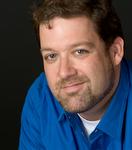I love when opera lovers recommend artists to be profiled on “Operatoonity.” Usually that means the performer has a following.

Such is the case with the accomplished baritone
W. A. “Andrew” Stuckey, whose career has whisked him around the world several times over, which explains his recommendation from “a voracious seeker of good opera and classical music” from Valencia, Spain.
Welcome to “Operatoonity,” Andrew!
Q: Where did you grow up and how did it affect your life choices?A: I grew up in the Midwest, Missouri and Kansas. I received my undergraduate from Kansas State University and my masters from the University of Kansas. I’m very thankful to have grown up in the Midwest and still value the friends I have from that time.Q: When did you know that you were destined to become an opera/classically trained singer?A: I certainly didn’t grow up wanting to become and opera singer. The career was really a result of my love for music combined with my proclivity for the challenges of opera. One must have the voice, a love for language and travel, the rehearsals, and the challenge of the art. By challenge of the art I mean the unique combination of drama, character development, musical proficiency and high performance standards (hopefully).
 Q: How would you describe your voice?
Q: How would you describe your voice? A: This is an interesting question because I’ve found that my own impression may not be entirely accurate. The term that I consistently hear from others is that it’s a beautiful voice–which is a great thing.
Q: What is it about your voice that makes you so successful singing Verdi baritone roles?
A: Generally, it’s a combination of timbre, range and tessitura. The Verdi baritone should have a powerful voice capable of singing in all dynamic ranges, a brilliant high range, and the ability to sustain a tessitura that is demanding.
Q: You’ve been described as equally adept at Italian, French and German
opera. Do you prefer one to the others?
A: I have more experience in the Italian language, though I must confess an irresistible preference for the sound of spoken French. Italian for singing is THE language without a doubt. The vowels are mainly open and easy to maintain and the consonants are, for the most part, a part of the legato.
“Baritone William Andrew Stuckey, in the role of Enrico, has a leonine voice of dark, smoky sonority and a stage presence to go with it.”
–Chuck Klaus, Syracuse Post-Standard
Q: Time for some faves. Favorite composer? Favorite opera? Favorite role? Favorite venue?
A: My favorite opera composer is without a doubt is Verdi. His writing for the baritone is unmatched. It is challenging and rewarding. He really has a sense of drama that is spot on and the melodic genius is seemingly unending.
My favorite opera is Rigoletto though I haven’t had a chance to perform it yet!!
My favorite role to sing thus far has been Scarpia. It is a role that is so intense that when it is performed well, the audience really responds. It is challenging beyond measure, but very memorable. In a comedic vein, Falstaff has given me the same pleasure. By the end of the opera, the characters’ spirit becomes a part of the audiences life (or should). I also feel that Verdi is speaking through the character of Falstaff in an intimate way. Leaving the world with a wink and a smile. Love it!!
As far as a favorite venue goes, I don’t really have a preference. There are some really fantastic theaters which are not in large cities. I just did fantastic Pirates of the Penzance in, of all places, Trenton, New Jersey, with Boheme Opera. The cast was fantastic and the theater in Trenton is a real jewel. A perfect size. But for me, it’s more about with whom I’m performing and the spirit of the production.
Q: What goes through your head when you are called in to sing a role on
only a few hours notice? How have you done this successfully?
A: What goes through my head is sheer panic! I’ve been called upon to do this three times in my career. The first was at the Lyric Opera of Kansas City at the beginning of my professional career. I was singing Wagner in Faust and chorus for the rest of the show. When I arrived at the theater, the stage director was pacing outside and asked my to go to the conductor’s (who was also artistic director) dressing room immediately. My first thought was that I had been sent to the principal’s office and was in trouble! I knocked on the dressing room and entered into a cloud of smoke. He asked me how well I knew Mephistopheles and I said not very. He explained that the singer (with whom I am still in touch) who was singing Mephistopheles didn’t think he could make it through the show. Well, I sang my role in act 2. He made it through the next act while I coached the role backstage in a stairwell with an electric keyboard. We made it through the rest of the opera twice. Then, still in costume for Wagner, I went to the orchestra pit and sang the role. It was quite the experience!
 The second time was with the Lyric Opera of Chicago. I was singing Yamadori and was an understudy for Sharpless. The principal artist got sick and I went on. The Lyric in Chicago does an excellent job of preparing the understudies so I felt very ready to go on.
The second time was with the Lyric Opera of Chicago. I was singing Yamadori and was an understudy for Sharpless. The principal artist got sick and I went on. The Lyric in Chicago does an excellent job of preparing the understudies so I felt very ready to go on.
The third was with Washington National Opera in Washington, D.C. I was an understudy for Jon Sorel. I ended up being called at 5 o’clock for an 8 o’clock start. Not much rehearsal and no costume fitting there so it was a good thing that he and I were about the same size.
Thankfully, they were all successful.
Q: According to your resume, you’ve been traveling for 13 years all
around the country and around the world. Still traveling? What were the great takeaways from your itineracy?

Brittany, 500 km from Paris, largest of Breton Islands
A: I still enjoy traveling though I don’t travel as much due to my school obligations. My favorite job was with the Festival Lyrique-en-mer in France. It takes place on an Island called, appropriately enough, Belle-ile during the summer from early July to mid-August. It is truly beautiful and during my second year there, I was able to bring my daughter, who was seven at the time, with me. We had such a fantastic time there. I hope to go back soon.
Q: What would you like to be doing in five years? Ten years?
A: I am in my first year at Rutgers University DMA program. I would like to continue to have a performing career but feel that I am ready to teach as well. I suppose that in five years and ten years I would like to be doing what I am doing, but maybe getting paid a LOT more. 

Andrew's Twitter pic
Q: When did you embrace social media and how has it impacted your career or visibility. Or has it?
A: We singers really needed Facebook. Let me explain. Our job entails traveling and rehearsing for 2-6 weeks, depending on the company. We get to know some fantastic people and before Facebook, it was not easy to keep in touch as our homes were all scattered throughout the world. For me, Facebook has been a wonderful way to re-connect with my colleagues and keep in touch.
The potential of Social Media in opera fascinates me. It is absolutely necessary for singers to have some sort of online presence. It doesn’t have to be anything special or over the top, but it is necessary. I have used Facebook and Twitter and have my own domain- www.wastuckey.com – where I have been able to maintain my own website for some years now. In fact, I wouldn’t have been referred to you had we both not been on Twitter. My former agent listened to a recording on my website and that helped inform her decision to work with me.
For instance- We just finished a show at Rutgers. Consider this. Every student in the show who is on Facebook conservatively has 500 friends. So let’s say twenty students publicize the show on their Facebook account. That’s 10,000 people who now know about the show and it is a narrowly targeted audience. The numbers are huge. Now, realistically, the percentages are not great. But social media absolutely is a great way to communicate with people who may be interested in what we do. In fact, the paradigm has shifted. Now people EXPECT to be able to interact with the artists they see or admire. I think that’s really cool and why shouldn’t it translate into our world of classical music?
Q: What is something most people don’t know about you, something not on your resume?
A: I’m really into baking bread and brewing beer. I generally think yeast is amazing.
Q: Where can we see you performing in 2010?
A: Just check out www.wastuckey.com

